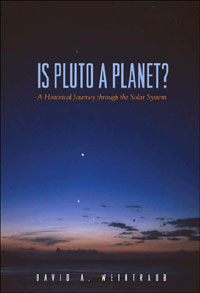Review: Is Pluto a Planet?by Jeff Foust
|
| The issue of Pluto’s status, writes Weintraub, “is a scientific question, not a matter of public opinion or a decision to be made by NASA or a panel of distinguished astronomers.” |
Weintraub, a professor of astronomy at Vanderbilt University, doesn’t attempt to immediately answer the question he poses in the book’s title. Instead, he embarks on a historical examination of what a planet is, and what bodies have been considered planets (or not) over the millennia: a mix, and often a clash, of astronomy, mathematics, politics, and religion. The definition of a planet, while not explicitly defined throughout human history, has clearly changed as humanity’s knowledge of the universe grew. In early Earth-centered models of the solar system, the Earth was not a planet, but the Sun (which, of course, clearly went around the Earth) was. For a time in the seventeenth century, the Galilean satellites of Jupiter—which Galileo himself called “Medicean stars” after his patrons—and the newly-discovered moons of Saturn were considered planets. More recently, the discovery of Kuiper Belt and similar icy objects in the distant fringes of the solar system blurred the already fuzzy line of planets and minor planets, an issue that came to a head at the IAU meeting in Prague last August.
Weintraub waits until the final part of the book to answer the book’s title question: is Pluto a planet? He eschews historical and cultural approaches, writing that the issue “is a scientific question, not a matter of public opinion or a decision to be made by NASA or a panel of distinguished astronomers.” His scientific approach leads to three physical criteria that all planets, he argues, must have: they must be big enough to be spherical but small enough not to sustain nuclear fusion in their cores, and also have a “primary orbit” around the Sun. Under those three conditions not only is Pluto a planet, but also a number of asteroids and Kuiper Belt objects. (Weintraub advocates a sort of dual citizenship whereby, for example, Ceres would be considered both a planet and an asteroid.) As for concerns that such a definition would lead to a large number of planets that would be difficult for students and the general public to remember, Weintraub notes, “simple answers are usually wrong”.
Weintraub’s definition is very similar to the original planet definition proposal submitted to the IAU last summer, but ultimately rejected in favor of a more restrictive one that excludes Pluto and other objects. That debate and its aftermath are oddly missing from the book, despite its 2007 publication date: an unfortunate oversight in an otherwise fine examination of what it means to be a planet, and whether Pluto qualifies. However, the story of Pluto’s planethood is not yet closed, as its advocates seek to revise the IAU planetary definition in such a way as to include Pluto. In any case, if you travel to Streator next month, it’s unlikely you’ll find too many people who will answer the question, “Is Pluto a planet?” with anything other than a “yes”.
